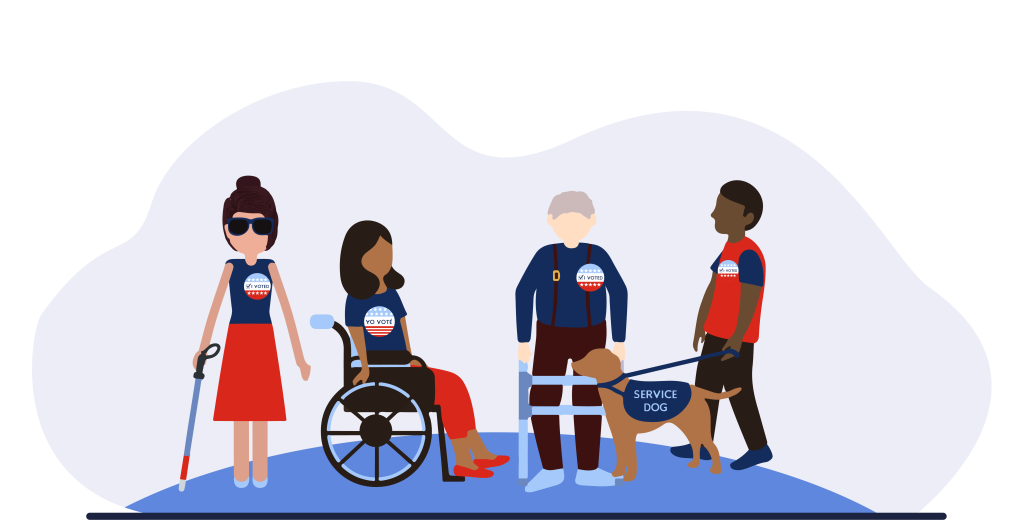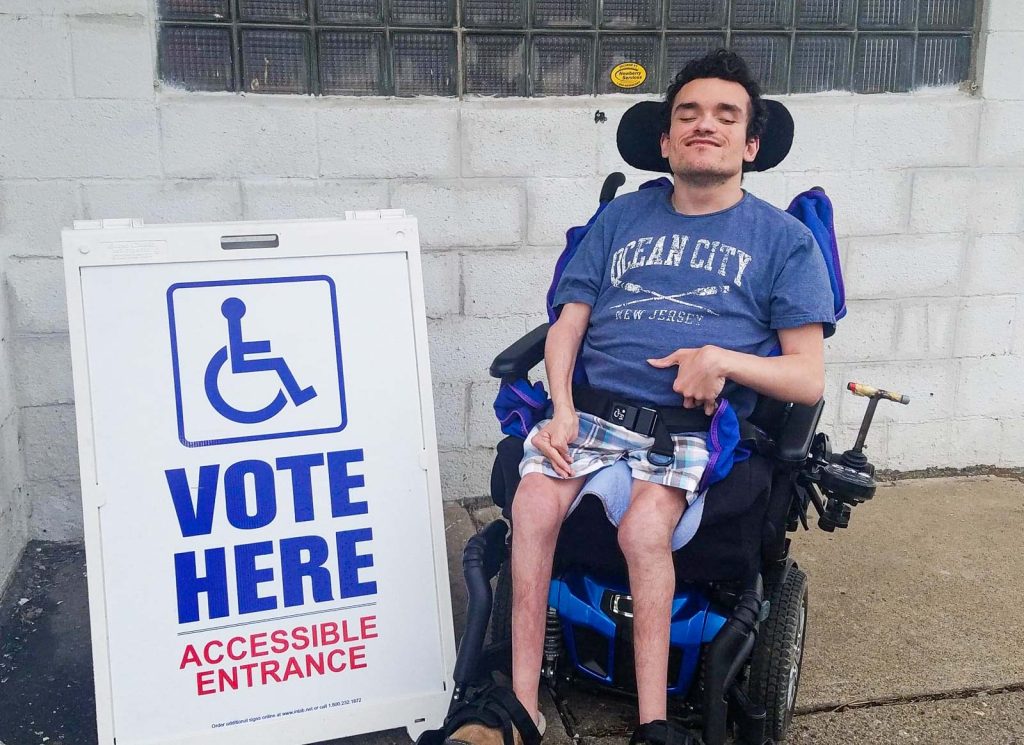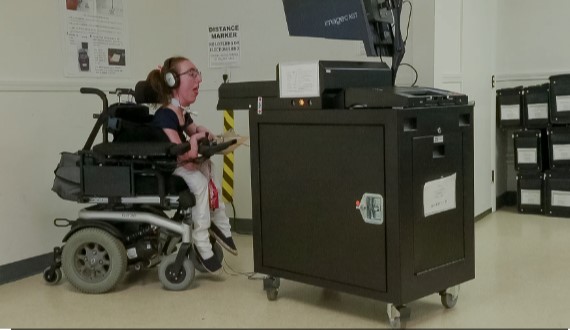
“Voting is one of our nation’s most fundamental rights and a hallmark of our democracy. Yet for too long, many people with disabilities have been excluded from this core aspect of citizenship. People with intellectual or mental health disabilities have been prevented from voting because of prejudicial assumptions about their capabilities. People who use wheelchairs or other mobility aids, such as walkers, have been unable to enter the polling place to cast their ballot because there was no ramp. People who are blind or have low vision could not cast their vote because the ballot was completely inaccessible to them.” [1]
“In 2020, over 11 percent of voters with disabilities reported that they faced some type of difficulty casting a ballot — more than any other group and despite expanded access to mail-in voting due to the pandemic. But instead of embracing the more accessible forms of voting that sparked record turnout, including among voters with disabilities, states have doubled down on new and more restrictive voter suppression laws.” [2]
“In 2021 alone, more than 400 anti-voter measures were introduced by states across the country, many of which are most burdensome to people of color and voters with disabilities. These measures run the gamut from restricting access to absentee voting, eliminating Election Day registration, and making it more difficult to vote early in person, to criminalizing the act of assisting voters with disabilities to vote. We’re challenging some of the measures that have become law in court in Georgia and Texas, where egregious restrictions illegally burden the right to vote for people with disabilities.” [2]

What is the Law? “Four federal laws are of special importance to disabled and elderly voters who have specific needs.
- Voting Rights Act of 1965: Any voter requiring assistance may receive it from a person of the voter’s choice, other than the voter’s employer or agent of that employer or officer or agent of the voter’s union.
- Voting Accessibility for the Elderly and Handicapped Act, 1984: Promotes the fundamental right to vote by requiring “access for elderly and disabled individuals to registration facilities and Vote Centers in federal elections”.
- Americans with Disabilities Act of 1990 (ADA): Requires public entities to provide program access, reasonable modification of policy, and auxiliary aids and services where necessary to afford an individual with a disability an equal opportunity to participate in and enjoy the benefits of service, program or activity conducted by a public entity.
Help America Vote Act of 2002 (HAVA): New federal legislation enabling greater opportunity for access and participation in the election process, including provisions regarding accessible voting technologies at Vote Centers by 2006.” [3]

New Accessible Voting Experience
“Vote Centers now provide more options than polling places, RR/CC is utilizing the benefits of technology for an easy and accessible voting experience. Elections are no longer a one-day event and voters with disabilities no longer need to vote in a separate voting booth. The Voting Solutions for All People (VSAP) model was designed to be intuitive and accessible for all voters, regardless of disability condition. The ballot marking device provides a private and independent voting experience that is accessible and convenient.” [3]
Voter Assistance for People with Disabilities
“There are multiple kinds of assistance voters with disabilities can utilize when casting their vote. The type of assistance a voter will need will depend on their disability. Types of assistance include:
- Assistance at Polling Stations: Many voters with disabilities can fill out a traditional ballot, however, they may require help or accommodations like:
- Assistance from another person: Protected by the Voting Rights Act of 1965, A voter with a disability may receive assistance from a poll worker or they can bring a person of their choosing to help them when casting their vote.
- A wheelchair accessible voting booth: An accessible voting booth should be available, with a polling machine located at a reachable height for wheelchair users.” [4]

Accessible Voting Machines and Technology
“If the above types of assistance do not meet your needs, you can use an accessible voting machine. Accessible voting machines are primarily used by those who are visually impaired or blind, and those who have motor disabilities that impact their ability to use a traditional touchscreen.
- Sip-and-puff devices: These devices allow voters with mobility disabilities to cast their vote by inhaling or exhaling through a straw-like device to make selections on an electronic ballot.
- Paddle devices: If a voter finds pressing small buttons to be a challenge, they can use a paddle device with two large buttons to make selections on a voting machine.
- Braille and audio devices: Voters with visual disabilities can use audio navigation and braille selection buttons with high color contrast to cast their vote.
While all polling locations are required to be accessible to people with disabilities, not all polling places will have the same assistive technology. If you are curious about your local polling locations accessibility, contact local and state election officials.” [4]

Disability Rights Oregon Resources
Disability Rights Oregon collaborates with the Secretary of State to publish a statewide, nonpartisan Easy Voting Guide for November general elections. You can order one to be mailed to your home. It uses accessible language for ballot measures, and candidates give their own information using accessibility guidelines. It has icons and pictures that provide visual cues.
Who can ask for help?
Any Oregon voter can ask for help from a friend or family member to register or vote.
They can ask for accommodations from their County Elections Office, including:
- fill out an email or online ballot (oregonvotes.org), print and return themselves
- a bipartisan Voter Assistance Team from the Elections Office to assist them to register or vote privately
- a large print ballot
- voting privately at home or at the Elections Office, on an electronic tablet that has enlarged text, text-to-voice, touchscreen, joystick, toggle switch, keyboard, and plugs for their own assistive technology
They can also ask an individual family member, friend, provider, or caregiver for help.
What id I have a problem or question?
“You can contact the Oregon Secretary of State Elections Division about voting questions. They can transfer you to your County Elections Office if necessary. If you believe a voter’s rights have been violated, you can file a formal complaint.
Telephone: 866-673-8683 (866-ORE-VOTE)
Online: oregonvotes.org
You can also contact DRO with problems or questions about voting rights related to a disability. We can help file a formal complaint.
Telephone: 800-452-1694
Online: disabilityrightsoregon.org
Email: welcome@droregon.org” [5]

Resources
[1] https://www.ada.gov/resources/protecting-voter-rights/
[2] https://www.aclu.org/news/voting-rights/voting-with-a-disability
[4] https://www.braunability.com/us/en/blog/disability-rights/voters-with-disabilities-resources.html
